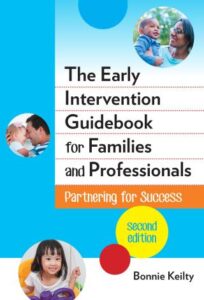Documentation in EI
This topical guide will introduce you to important books, videos, and information resources available from the EI Clearinghouse and other sources. Contact us via online form or by phone (1-877-275-3227) to request a resource listed below (or ask your local public librarian). Note that some videos may be viewed online, and journal titles will take you to the publisher’s homepage.
Table of Contents

EIC Resources
No resources have been added to this section yet. However, new resources are added frequently!Books
This text book includes information on performance assessment, portfolios, and other methods of reporting a child’s performance. Written for future teachers and current teachers of young children, this book ncludes information about standardized tests and other types of assessments that are appropriate for young children. Chapter 5 addresses documentation.
This book explores how emergent curriculum principles and practices can improve a early childhood program. Sections on observation, documentation, assessment, and relationships that support learning provide a subject overview.
The updated and expanded fourth edition of this text provides a reader-friendly foundation in occupational therapy for the treatment of people with mental health problems. It addresses techniques in working with patients whose disorders are not primarily psychiatric. Sections include organizing yourself, interactions with patients, and documentation.
This book is both resource and workbook. It can help early childhood education students and practitioners learn to gather and interpret data to gain insight into child development. The chapters provide information on child development, including children with special needs.
With a focus on how families and professionals can collaborate effectively so that infants and toddlers learn, grow, and thrive, this book reflects research and best-practices in the field of early intervention. The book includes a chapter on assessment and planning outlining how parents and professionals can work together throughout the process.

This guidebook on family-professional partnerships has been used as a go-to early intervention resource in university coursework, for in-service professional development, and as support to families in/or considering early intervention. Specific components of early intervention – evaluation and assessment, program planning, intervention implementation, service coordination, and transition – are also discussed.
This book contains a collection of articles describing aspects of the ways young children develop and learn. The topics covered include family-centered care, assessment, documentation, play, illness, and more.
Videos and Media
Teachers and education coordinators demonstrate the system they use to collate the observational data on young children. A variety of portfolio systems are explored. Teachers demonstrate the linkage between the formative assessment system they are using and how that data informs the formal assessment or checklist.
This video explores a variety of authentic assessment techniques used in preschool settings to document the growth of young children in their classrooms, including observations, work samples, and more.
This video discusses why and how to document children’s early learning and what it can reveal. It includes a visit to the Power of Documentation Exhibit at the Chicago Children’s Museum.
Organizations
No resources have been added to this section yet. However, new resources are added frequently!Articles
This article published in an online journal covers the importance of documentation in demonstrating the attainment of skills throughout the learning process.
This article presents a round-table discussion that explores the key questions regarding the definition of documentation, common misunderstandings of the strategy, lessons that have emerged over decades of documenting in various contexts, and puzzles that are emerging for the future of the practice. The discussion reminds the reader that documentation is not just a teaching tool, but a pedagogical philosophy of knowing and valuing children.
This article describes the use of documentation by teachers and their children with pervasive developmental disorder (PDD) to develop skills of self-determination. Visual feedback, such as photos and video, help teachers plan and children evaluate their performance in social situations, such as finding a friend to play with at recess. This documentation serves as a tool to create a narrative with both the child and the teacher.
This paper in an online journal outlines and discusses observation and documentation as useful for understanding. Videos are described as a resource for revisiting and analyzing documented observations.
Web Resources
This free, downloadable guide that is designed for use by early childhood professionals. The guide includes explanations of best practices in assessment as well as a compendium of assessment instruments.
This Growing Ideas tip sheet describes developmentally appropriate assessment techniques, including how to gather and store documentation.
A one-page tip sheet to help service providers with documentation in the Illinois Early Intervention System. The tip sheet includes rules, reminders and tips in a colorful format that puts everything in one place! The PDF is included in the revised Systems Overview Follow Up packet and additional helpful information can be found on the EITP Virtual Office Hours page and EITP Billing and Documentation page.
This Illinois Early Intervention Services System guide for providers includes principles of early intervention, important early intervention policies and procedures, required forms, definitions, and more.
This page includes links to many resources, including overviews of assessment methods, information on the assessment of young English-language learners, and position papers on assessment from several national organizations such as Head Start and the National Association of School Psychologists.

